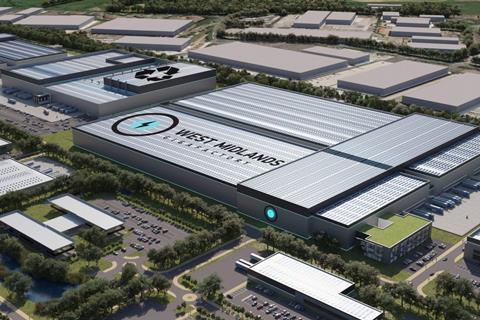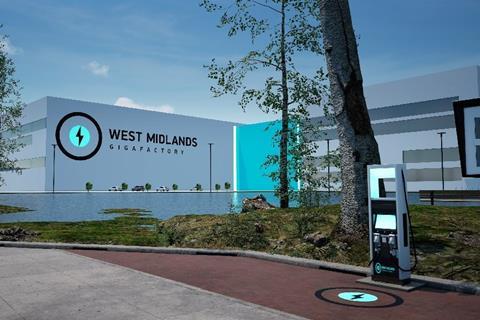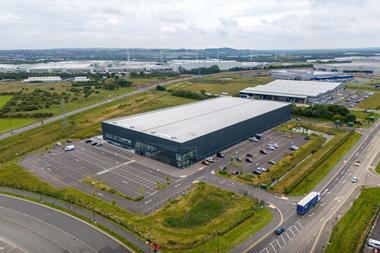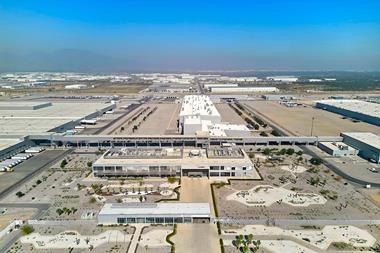The Coventry and Warwick Gigapark seeks to anchor the UK’s position in Electric Vehicle (EV) battery Production. With 5.7m sq.f of industrial space, incentives, and a central location, it’s a critical response to ZEV mandates and global competition.

UK automotive production faces unprecedented challenges and an uncertain future, and the Coventry and Warwick Gigapark now emerging as a key project encapsulating both the opportunities and obstacles confronting the region’s automotive industry. Against a backdrop of declining production, possibly overly-ambitious policy targets, and intensifying global competition, the Gigapark represents a bold vision for revitalising domestic electric vehicle EV manufacturing.
Attempts to invigorate struggling sector: Is Coventry and Warwick Gigapark the future of UK automotive manufacturing
With UK automotive production facing unprecedented challenges and an uncertain future, could the Coventry and Warwick Gigapark play a pivotal role in its future success? The project, which is currently seeking investors, encapsulates both the opportunities and obstacles confronting the industry as a whole. Against a backdrop of declining production, ambitious policy targets, and intensifying global competition, the Gigapark is a move towards revitalising domestic EV manufacturing.
The UK’s automotive production and a history of innovation, decline and prospect
The UK’s automotive manufacturing story is one of early pioneering innovation and apparent gradual decline. Once a global leader, the industry has faced significant decline in recent decades, driven by shifting global supply chains, economic pressures, and political decisions.

In the first half of 2024 alone, UK car production fell by 7.6% to 416,074 units, with exports—historically the backbone of the industry—declining by 13.9%, according to the Society of Motor Manufacturers and Traders (SMMT). The drop reflects a broader struggle to transition smoothly to EV production while contending with global competitors offering lower costs and greater economies of scale.
The Zero Emissions Vehicle (ZEV) mandate adds further complexity. Requiring 22% of new UK vehicle sales to be zero-emission in 2024 and 100% by 2035, the policy notoriously places immense pressure on manufacturers already grappling with tepid EV demand. Executives from major players, including Stellantis, have expressed their frustration, with Stellantis’ UK managing director raising the prospect of withdrawing from UK van production altogether.
But there are still many industry experts who can see the region’s automotive production prospects improving. “The UK auto industry is moving at pace to build the next generation of EVs,” said Mike Hawes, Chief Executive of SMMT, “a transition that can be a growth engine for the entire British economy.”
Coventry and Warwick Gigapark: A push to revitalise UK automotive manufacturing
The Coventry and Warwick Gigapark seeks to turn these challenges into opportunities. The 251-hectare site, a joint venture between Coventry City Council and Coventry Airport, aims to establish a state-of-the-art gigafactory at the heart of the UK’s automotive ecosystem. With outline planning permission secured for 5.7 million square feet of industrial space, the Gigapark has been designed to attract global battery manufacturers and investors, offering a critical response to the UK’s EV ambitions.

Local government support has de-risked the project, with significant investment in utilities and transport infrastructure. Plans for an Investment Zone promise further incentives, including reduced business rates and enhanced capital allowances.
Strategically located near major automotive hubs such as JLR, Aston Martin Lagonda, and BMW/Mini, the Gigapark is positioned to integrate with the West Midlands’ established supply chain and established production ecosystem.
The role of policy and the context of global vehicle manufacturing
But despite its promise, the Gigapark operates within a complex and challenging policy landscape. The ZEV mandate and the impending ban on internal combustion engine (ICE) vehicles are critical to the UK’s decarbonisation goals, but they also exacerbate existing pressures. Stellantis’ warning about the ZEV mandate’s impact on van production highlights these tensions.
However, closer analysis suggests that economic considerations, rather than regulatory requirements, are the primary threat. Stellantis’ Luton and Ellesmere Port plants already operate as secondary facilities, with their larger, lower-cost counterparts in Turkey, Spain, and Portugal offering superior economies of scale.
”Globally, the automotive manufacturing landscape is undergoing seismic shifts”
Globally, the automotive manufacturing landscape is undergoing seismic shifts. China has emerged as a dominant force in EV production, accounting for over half of the world’s EV sales in 2023. Its aggressive government policies, vast domestic market, and vertically integrated supply chains have made it the global leader in battery and EV production.
Read More Gigapark and Battery Production Stories
- EV battery supply – potential materials shortages
- How BMW’s San Luis Potosí leads in sustainable production
- North America is aiming to make EVs affordable for the masses - here’s how
- Tesla’s EV battery production and global gigafactory network
Meanwhile, the European Union has invested heavily in gigafactories, with Germany leading the charge, supported by extensive subsidies and a robust industrial base. In North America, the US Inflation Reduction Act has spurred a wave of investments in EV manufacturing, with incentives designed to reduce reliance on Chinese-made batteries and components.
”For a nation at a crossroads, its success or failure will resonate far beyond the West Midlands”
These developments underscore the scale of the challenge facing the UK. While global competitors consolidate their positions, the UK must address its relatively small domestic market, higher production costs, and fragmented supply chains to remain competitive. “Amid fierce global competition,” Hawes noted, “industry and government must work quickly to deliver commitments, creating an industrial strategy that enables the growth the economy craves.”
A broader vision for UK automotive manufacturing
The Coventry and Warwick Gigapark’s success depends not only on attracting investors but also on addressing systemic issues within the UK’s automotive manufacturing environment. The West Midlands, long considered the heartland of British automotive production, is uniquely positioned to lead this charge. One-third of UK-made cars and a quarter of its engines originate from the region, supported by world-class research centres like the Advanced Propulsion Centre and the UK Battery Industrialisation Centre.
However, the region’s future hinges on its ability to adapt to new realities. The SMMT’s projection that UK light vehicle production was to decline by 9.3% in 2024 reflects the growing pains of transitioning to EVs. Yet, by 2028, production is expected to rebound to 1.1 million units, with over half of all vehicles being zero-emission. The Gigapark can play a pivotal role in this recovery by anchoring battery production within the UK and reducing reliance on imports.
”[The Gigapark’s] integration with the West Midlands’ automotive cluster, combined with government-backed incentives, positions it as a critical asset in the transition to EVs”
Lessons from the past and present
Ford’s transformation of its Halewood facility offers a valuable lesson. By investing £380 million to produce 420,000 electric drive units annually, Halewood demonstrates how strategic investment and government support can secure the UK’s position in the EV supply chain. Similarly, the Gigapark must align with broader efforts to modernise infrastructure, streamline planning processes, and support skills development.
The road ahead
The Coventry and Warwick Gigapark represents a litmus test for the UK’s ability to adapt and compete in a globalised automotive landscape. Its integration with the West Midlands’ automotive cluster, combined with government-backed incentives, positions it as a critical asset in the transition to EVs. Yet, its success is far from guaranteed. Policymakers, investors, and industry leaders must act decisively to address the structural challenges facing the UK’s automotive sector.
The stakes could not be higher. With projections that the UK could produce nine million zero-emission vehicles by 2035, worth over £290 billion, the Gigapark offers a unique opportunity to secure a future where the UK needs to remain a competitive player in the global EV market.
However, failure to deliver on this promise risks further erosion of the UK’s automotive manufacturing base, leaving it vulnerable to international competitors with deeper pockets and greater scale. Globally, the race for EV dominance is accelerating, and the UK’s ability to participate meaningfully depends on projects like the Coventry Gigapark. It is more than just a manufacturing site; it is a statement of intent, a beacon for innovation, and a critical component of the UK’s industrial strategy in the 21st century.
For a nation at a crossroads, its success or failure will resonate far beyond the West Midlands.






































No comments yet